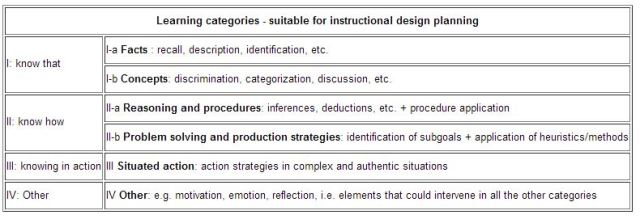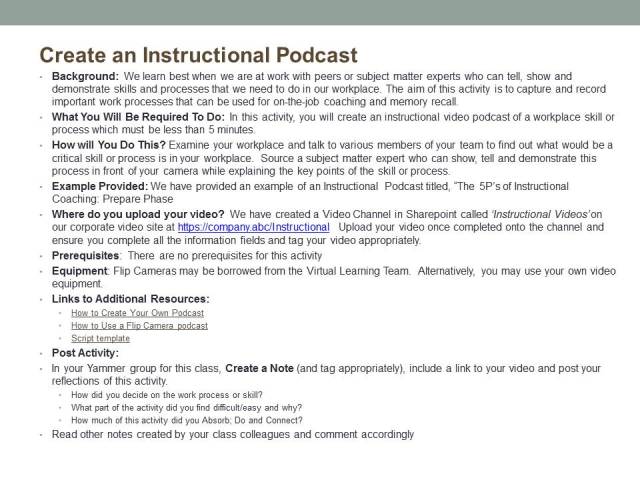What was the last time you learned anything?
I’d say I’m actually learning ALL THE TIME and to keep a track of it, I write monthly blog posts where I write down what I learned that month and how I have applied it to my work.
You can read what I learned last month.
This week we talk about ‘Learning Types’ – the types of knowledge and skills learners need to acquire and we were shown this table.
By far, my preferred learning type is ‘Knowing in Action: Situation Action – action strategies in complex and authentic situations’ (which may explain why I hated the games so much) with a bit of reflection on the side.
Activity 3.1 Theories of Active Learning
In this activity I chose Community of Practice as my learning theory.
- how you learn;
- your current practice;
- the design of Technology Enhanced Learning activities.
In the last couple of years, I have been involved in a couple of communities of practice which are groups of people who get together to engage in collaborative learning.
I would say that my knitting groups are communities of practice; as are our monthly breakfast get-togethers with other Learning and Development professionals in Melbourne. This is because these have 3 elements that define a CoP:
(a) We have our domain of interest – if it’s learning, or if it’s knitting, one thing that ties us is our passion for our craft
(b) Our community – Every month the ladies get together at the local church at Albert Park. We bring along our baked goods and the knits we are working on. More often than not, I bring my knitting problems because I know they’ll get solved. Similarly, at Left Bank Cafe on the last Wednesday of every month, we come along to talk about our workplace L&D issues and discuss, share information and help each other.
(c) Our practice. We are all practitioners of our craft and considered equals in the community. We have various resources, stories and tools that we use to address any problems members of the groups are experiencing.
I like the Community of Practice as a way to learn with the workplace in particularly as it brings together a diverse group of people who are all interested, connected and passionate about their craft. It is also quite social and for me, I know I learn best when I’m part of a group listening to stories and learning from others.
Activity 3.2 Active Play
We were asked to spend 30 minutes playing in one of the following games:
I’m not much of a game player. Online games, I mean.
If you were to pull out a board game or a deck of cards that friends can enjoy over a glass of wine, some nibbles and laughter, then I would happily accept that. Playing for hours in a darkened room by myself with other players who are also playing in darkened rooms all by themselves, well…that’s just sad.
I have better things to do with my time. I count that more as time wasting than learning.
When I first got a Facebook account, friends would invite me to play Farmville and some other games and I found countless hours lost online while I tended my virtual farm to collect virtual tokens to buy virtual hay for my virtual cows.
One day, I just got sick of it. I stopped. I had enough. The game was sucking the life out of me. I had nothing tangible to show for it at the end of it. There was no real pleasure, no tangible output and frankly, people didn’t want to hear about my virtual farm – not when they had their own vegetable gardens and were showing me REAL outputs of their labour – real conditions – real learning – real tomatoes. So like a god from above, I watched my crops slowly die off and then never accepted any other game requests from friends again.
In all honesty, I think I wasted 30 minutes of my life with these games. If I had to pick one, it would be the Runescape because I had control over how my character looked but reading all the text on the screen really bored me. Waiting for the updates on the screen bored me. The storyline? Boring. And really, clicking like a maniac while my character [name Avandra – I like coming up with avatar names, I think that’s all I’m good for in games] spins around but doesn’t use her sword to kill a troll? Useless.
Of course it may have been because I chose the bloody sword for my weapon before I knew we were going to be fighting trolls. But that’s the detail. Really, is this stuff really teaching me anything? No, not really but it is teaching me that some learning approaches (like games) aren’t for everyone.
Meanwhile my husband LOVES games – the more realistic, strategic and heavily role played the better. Zombies, soldiers, medieval heroes that fly off tall buildings, anything. He would happily play some Batman in Arkham Asylum game for days, hours at a time while he figures out how to make the bat fly with certain commands. I don’t get that.
So you might ask, “what IS a game you like or that you have learned from?”
Well let’s just say PS3 Guitar Hero (we have all the games).
Now there is something that I loved because it sets the context for you. You start off as a small time band in a small town and you play at various venues to make it to the big stage. You are lulled into the sense that you’re actually doing something – even if it’s pretending to know how to play a guitar. You hear the music notes of the chords you play, you recognise the songs, you get the ovation and adulation and you’re transformed into a rock god. Guitar Hero inspired both my husband and I to consider learning how to play the guitar, it piqued our interest with music, we went through the angst, stress and pressure of what real bands go through.
Before you know it, hours have passed. Despite the lower back pain because you’ve been standing all day, you’re in a great mood because you’ve just played and sung along to rock songs that you grew up with – and you had a chance to share the game with your husband.
Activity 3.3a Design an Activity
In this activity, we had to design a learning activity and consider the learning outcomes and the pedagogic approach adopted. I decided to do one related to my workplace around skills and processes where the Learning Type of my learners was to explore ‘Know How’ by reasoning and procedures; and problem solving and production strategies.
I’ve noticed that at our work we have had an increase in requests for podcasts to be created but many of them are simply ‘talking heads’. I decided to vary the style and instead, make a learning activity out of this and help the learner in the workplace to create ‘instructional videos’ around their important work processes and skills that can be used as a catalogue of video assets that can be used and reused in the future. I believe the learning is two fold:
(a) Primarily, sourcing the critical skill or work process
(b) Secondly, the use of the tool (flip camera, editing process, uploading onto social platform) so that there is a level of comfort with the use of the camera and video editing software minimising these requests that go to the virtual learning team. A self-service option if you will…
I provide an example of my crudely prepared instructional video:
Here is the learning design activity:


[…] ← Week 3: Designing Active Learning for #OCTEL […]